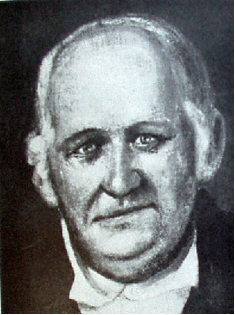Colonel James Hillman
(1762 – 1848)

In the last issue John Young, the founder of Youngstown, had just set up his surveying camp on the banks of the Mahoning River in 1796 when an Indian trader by the name of James Hillman came paddling down the river in a canoe. The following story tells of this historic meeting and the life of this early pioneer, soldier, and law officer.
James Hillman was returning to his home in Beavertown from one of his trading expeditions when he saw smoke coming from a riverside camp. He stopped to investigate. Greeting him were the men in John Young’s surveying party. These thirsty campers soon learned that Hillman had some whiskey in his canoe. Young traded his bed for this whiskey – the deerskin that he had been sleeping on. Deerskins and whiskey had the same monetary value, each one being worth one dollar. After a night of celebrating the Fourth of July the surveying party and Hillman returned to Beavertown. While there, John Young persuaded his new friend to return with him to his surveying camp and help stake out a new town. Young offered Mrs. Catherine Hillman a gift of six acres of land if she would join her husband and live in this new settlement. She accepted the offer and before December James Hillman built the first log cabin on the east bank of the Mahoning River at the site that later became known as Spring Common (Front Street and West Federal) in the City of Youngstown, Ohio.
In 1798 the Hillmans purchased 60 acres of land between the river on the north, Myrtle Avenue on the south, Market Street on the east and Oak Hill on the west. On the site later occupied by the South Side Hospital they built the first frame house in the Western Reserve.
James Hillman, the First Citizen of Youngstown
James Hillman was born in Northumberland County, Pennsylvania in 1762. While yet a boy he enlisted as a soldier in the Revolutionary War and was captured at the battle of Yorktown. He escaped after a struggle with a British officer. When the war ended he moved with his father to Pittsburgh. James was about five feet eight inches tall with broad shoulders and possessed great physical strength. At the age of 22 he again enlisted as a soldier, serving under General Josiah Harmar in the Indian Wars. When a treaty with the Indians was made in August 1785, Hillman was discharged at Fort McIntosh at Beavertown located on the Ohio River.
His courtship and marriage were conducted in 1786 in the same dashing way that he fought the British and the Indians. He met his 14 year old wife-to-be at a corn husking and, after dancing with her several times, he proposed. Since there was a Justice of Peace present they were married on the spot. Their marriage lasted 62 years. Being childless, the Hillmans left no direct descendants.
After his marriage Mr. Hillman found employment with the firm of Duncan & Wilson of Pittsburgh. As their agent his duties included delivering supplies to the mouth of the Cuyahoga River from whence they were transported to Detroit. He soon found it more profitable to be an independent trader with the Indians. He also served as a guide up the Beaver and Mahoning Rivers. His knowledge of the territory and the confidence of the red man proved very valuable to the white settlers coming to the Western Reserve in later years. He was considered by the Indians to be a man of honor and fairness and Hillman was able to settle many quarrels between the pioneers and the Indians.
In 1800, Hillman was appointed the first constable of Youngstown Township. Later he served as tax collector and Justice of the Peace. In 1804 Hillman purchased more land on West Federal Street up to what is now Phelps Street. Here in a log house he opened the first tavern in Youngstown. (near today’s Powers Auditorium) In 1806 Hillman was appointed Sheriff of Trumbull County which at that time embraced the entire Western Reserve.
Hillman served as wagon master during the War of 1812. It was at this time that he obtained the military rank of Colonel. After the war he purchased a farm east of Crab Creek that he later sold to Homer Hine. (There will be a future article on the Hine Family in Poland.)
On November 11, 1807, Colonel Hillman was raised to Master Mason in Erie Lodge No. 47 of the Free and Accepted Masonic Order in Warren, Ohio. In 1874 Masonic Lodge No. 481 was chartered at Youngstown, Ohio and was named in honor of James Hillman, the city’s first citizen.
Hillman served as a member of the Ohio State Legislature during the 1814-1815 sessions and was elected Justice of the Peace in 1825, an office he held for several years. He was described as shrewd, active, industrious, brave, kind-hearted, a good neighbor, and a good citizen. He had some education, could write a fair hand, and was a good business man.
James Hillman is buried in the Oak Hill Cemetery, Lot No. 135. His headstone reads: “In memory of Colonel James Hillman, born October 27, 1762, died November 12, 1848, age 86 years, 1 month and 15 days.”
